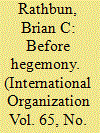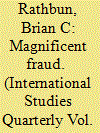| Srl | Item |
| 1 |
ID:
103889


|
|
|
|
|
| Publication |
2011.
|
| Summary/Abstract |
Rationalist accounts of international cooperation maintain that states create international institutions to solve problems of distrust. They rest on a particular notion of trust, a strategic variety in which states trust based on information about others' interests. I seek to overturn this conventional wisdom. Drawing on social psychology, I point to the importance of generalized trust, an ideological belief about the trustworthiness of others in general. Generalized trust precedes institution-building and serves as a form of anarchical social capital, facilitating diffuse reciprocity and allowing state leaders to commit to multilateralism even in cases that rationalists deem inhospitable to cooperation and without the institutional protections that rationalists expect. In case studies of U.S. policy on the creation of the League of Nations and the United Nations, I demonstrate that generalized trust is necessary for explaining the origins of American multilateralism and the design of these organizations.
|
|
|
|
|
|
|
|
|
|
|
|
|
|
|
|
| 2 |
ID:
103301


|
|
|
|
|
| Publication |
2011.
|
| Summary/Abstract |
This article seeks to overturn the conventional wisdom that World War II forced a decisive, bipartisan break in American grand strategy. As they had after World War I, American political elites debated the relative merits of unilateralism and multilateralism. Assessments of the relative costs and benefits of a cooperative and multilateral solution to American security depended on judgments about the likelihood of opportunism by America's partners. Democrats were more trusting than Republicans, expecting cooperation where the latter anticipated defection. This led to different preferences for the creation and design of the United Nations and the North Atlantic Treaty. Drawing on theories of "social orientation" and political ideology, I explain why the left is more trusting than the right. Rationalist accounts of the creation and design of the UN and NATO overstate the case for ideological convergence and therefore the importance of structure because they largely ignore behind-the-scene bipartisan consultations that allowed for a compromise prior to the votes on the respective treaties. My social psychological theory of international cooperation demonstrates that multilateralism is a dispositional trait, not a simple functional response to some objective security situation.
|
|
|
|
|
|
|
|
|
|
|
|
|
|
|
|